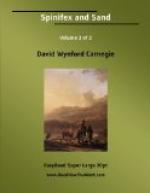[* “Bardies” are large white grubs—three or four inches long—which the natives dig out from the roots of a certain shrub. When baked on wood-ashes they are said to be excellent eating. The natives, however, prefer them raw, and, having twisted off the heads, eat them with evident relish.]
Benstead had managed to bring up a few sheep from the coast, which the “gins,” or women, used to tend. The native camp was near the slaughter-yard, and it used to be an interesting and charming sight to see these wild children of the wilderness, fighting with their mongrel dogs for the possession of the offal thrown away by the butcher. If successful in gaining this prize they were not long in disposing of it, cooking evidently being considered a waste of time. A famished “black-fellow” after a heavy meal used to remind me of pictures of the boa-constrictor who has swallowed an ox, and is resting in satisfied peace to gorge.
The appeal of “Gib it damper” or “Gib it gabbi” (water), was seldom made in vain, and hardly a day passed but what one was visited by these silent, starving shadows. In appreciation no doubt of the kindness shown them, some of the tribe volunteered to find “gabbi” for the white-fellow in the roots of a certain gum-tree. Their offer was accepted, and soon a band of unhappy-looking miners was seen returning. In their hands they carried short pieces of the root, which they sucked vigorously; some got a little moisture, and some did not, but however unequal their success in this respect they were all alike in another, for every man vomited freely. This means of obtaining a water supply never became popular. No doubt a little moisture can be coaxed from the roots of certain gums, but it would seem that it needs the stomach of a black-fellow to derive any benefit from it.
Though I cannot say that I studied the manners and customs of the aboriginals at that time, the description, none the worse for being old, given to savages of another land would fit them admirably—“Manners none, customs beastly.”
CHAPTER II
“Hard up”
During that drought-stricken Christmas-time my mate was down at the “Cross,” trying to carry through some business by which our coffers might be replenished; for work how we would on alluvial or quartz reefs, no gold could we find. That we worked with a will, the remark made to me by an old fossicker will go to show. After watching me “belting away” at a solid mass of quartz for some time without speaking, “Which,” said he, “is the hammer-headed end of your pick?” Then shaking his head, “Ah! I could guess you were a Scotchman—brute force and blind ignorance!” He then proceeded to show me how to do twice the amount of work at half the expenditure of labour. I never remember a real digger who was not ready to help one, both with advice and in practice, and I never experienced that “greening” of new chums which is a prominent feature of most novels that deal with Australian life.




